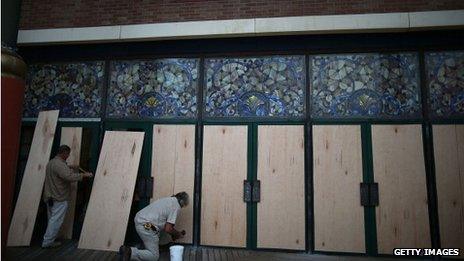Sandy: Damage estimated at up to $20bn
- Published

Businesses in gambling mecca Atlantic City were boarded up
Businesses on the US East Coast have continued to be disrupted by storm Sandy, with total damage estimated at between $10bn and $20bn (£6bn-£12bn).
Sandy has flooded subway and road tunnels in much of Lower Manhattan.
Beyond New York City, public transport has been halted in several eastern US cities, and thousands of flights have been grounded.
And US stock markets have had to close again on Tuesday, the longest period since 9/11.
It is also the first time the weather has shut them for two consecutive days since 1888. The estimate of damage comes from disaster risk modelling firm Eqecat.
Both the New York Stock Exchange (NYSE) and the Nasdaq exchanges plan to reopen on Wednesday. NYSE said that its famed trading floor - based close to the major flooding in Lower Manhattan - remained undamaged.
Wednesday is a key trading day because it is the last day of the month, when traders price their portfolios.
Transport disruption
Sandy threatens an 800-mile (1,290-km) swathe of the US, from the Atlantic Ocean to the Great Lakes in the Mid-West and killed 66 people in the Caribbean last week before pounding the East Coast of the US.
The storm has closed thousands businesses and severely affected the infrastructure of the nation.
The closure of public transport along the US East Coast means millions of people are unable to get to work.
Air traffic to and from the region has also been severely disrupted and nearly 14,000 flights were cancelled, potentially hurting airlines that were already struggling in the weak economy.
Amtrak has suspended passenger train services across the north-east.
The UN headquarters in New York is also to stay closed, while public transport was suspended in Washington DC, New York, Baltimore, Philadelphia and Boston.
Rebuilding benefits
Paul Ashworth, an economist at Capital Economics, said that depending on how long flooding lasts, the hurricane could maybe shave one tenth of US output during the quarter.
"But you have to remember that the hurricane generates extra activity too, in terms of the clean-up and rebuilding," he told the BBC.
"In theory, it could even be a positive for the economy."
Peter Morici, an economist and professor at the University of Maryland, estimated that some $15bn to $20bn will likely be spent on rebuilding after the storm, which could create as much as $36bn in an "economy with high unemployment and underused construction resources".
"When government authorities facilitate quick and effective rebuilding, the process of economic renewal can leave communities better off than before in many tangible ways."
Power outage
Roan Kirby, a farmer in Hope, New Jersey, told the BBC he has had to shut his farm down during the storm.
"I see no mention of the impact on farmers," he said.
"It is easy to forget livestock, stored crops and buildings that are at great risk. If trucks cannot get through to pick up milk at the farms and if the processing plants are affected, milk supply will surely be affected. Milk will have to be disposed of on the farm if it cannot be collected, which will mean a huge loss of income."
In New York, the US financial capital, an explosion at a sub-station caused power outages and darkened most of downtown Manhattan as well as Westchester County and affected more than 650,000 customers, power company Consolidated Edison said.
"This is the largest storm-related outage in our history," said John Miksad, Con Ed's senior vice president for electric operations.
Six million homes are currently without power.
"It will be days before we can know the full extent of the damage left behind by Hurricane Sandy in New York City and the rest of the state," Rob Lillpopp, a spokesperson for the Business Council of New York State, told the BBC.
"We are just a year removed from Hurricane Irene, and what we learned from that devastating storm is that small and large businesses can and will pull together to recover."
In Europe, shares in Swiss Re rose 1.3% and Munich Re shares were also higher. The two companies are reinsurers - they insure insurers, who will have to pay out a large amount to businesses and individuals affected by Sandy.